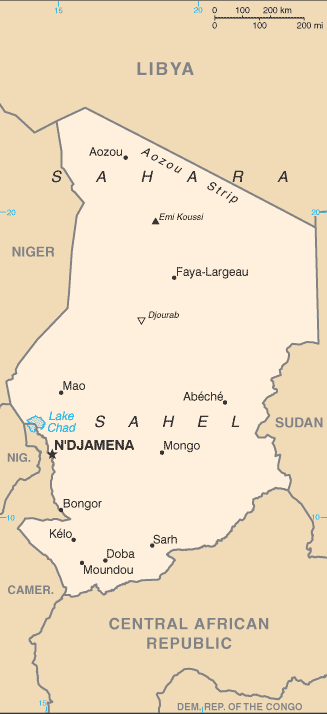Welcome to the Virtual Education Wiki ~ Open Education Wiki
Chad: Difference between revisions
No edit summary |
|||
| Line 1: | Line 1: | ||
''author byline'' | |||
== Chad in a nutshell == | == Experts situated in Chad== | ||
== Country in a nutshell == | |||
<!--(please enter a few sentences - focus on name(s) of country, location, population, capital city)--> | |||
[[Image:Cd-map.gif|right|thumb|400px|Source : http://www.cia.gov]] | [[Image:Cd-map.gif|right|thumb|400px|Source : http://www.cia.gov]] | ||
| Line 17: | Line 21: | ||
Chad is home to over 200 different ethnic and linguistic groups, which create diverse social structure. Arabic and French are the official languages. Islam is the most widely practiced religion. | Chad is home to over 200 different ethnic and linguistic groups, which create diverse social structure. Arabic and French are the official languages. Islam is the most widely practiced religion. | ||
== | == Education in Country == | ||
<!-- overview of all sectors --> | |||
== School-level education == | |||
== Further and Higher education == | |||
=== Universities in Country === | |||
<!--(this is an important section)--> | |||
=== Polytechnics in | === Polytechnics in Country === | ||
=== Colleges in Country === | |||
== | == Education reform == | ||
| Line 45: | Line 50: | ||
== | == Information society == | ||
== ICT in education initiatives == | |||
=== | === Virtual initiatives in schools === | ||
=== | === Virtual initiatives in post-secondary education === | ||
| Line 70: | Line 70: | ||
== References == | == References == | ||
(try to add one or two) | <!--(try to add one or two)--> | ||
---- | ---- | ||
| Line 78: | Line 78: | ||
[[Category: | <!--''Don't forget to change "Pangaea" to the relevant country - and also to the relevant containing continent or continental/oceanic/political (sub)region!''--> | ||
[[Category:Pangaea| ]] | |||
[[Category: | |||
[[Category:e-World| ]] | |||
Revision as of 11:33, 23 April 2011
author byline
Experts situated in Chad
Country in a nutshell

Chad (French: Tchad, Arabic: تشاد Tshād), officially known as the Republic of Chad, is a landlocked country in central Africa. It is bordered by Libya to the north, Sudan to the east, the Central African Republic to the south, Cameroon and Nigeria to the southwest, and Niger to the west. Due to its distance from the sea and its largely desert climate, the country is sometimes referred to as the "Dead Heart of Africa".
The population of Chad is just over 10.7 million (CIA July 2011 est.): 26% live in urban areas and 74% in rural ones. The country's population is young: an estimated 47% is under 15. The birth rate is estimated at 42 births per 1,000 people, the mortality rate at 16.69. The life expectancy is 47.2 years
Chad is divided into three major geographical regions: a desert zone in the north, an arid Sahelian belt in the centre and a more fertile Sudanese savanna zone in the south. Lake Chad, after which the country is named, is the largest wetland in Chad and the second largest in Africa. Chad's highest peak is the Emi Koussi in the Sahara, and N'Djamena,(formerly Fort-Lamy), the capital, is the largest city.
Politically, Chad is divided since February 2008 into 22 regions.
Chad is home to over 200 different ethnic and linguistic groups, which create diverse social structure. Arabic and French are the official languages. Islam is the most widely practiced religion.